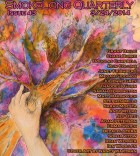What aspects of flash fiction draw you to the form? Do you exclusively write flash fiction or does the length of your stories vary?
I like concision. I like tightly packed sentences and ideas. I like writing that doesn’t feel superfluous. Flash fiction has always struck me as poetic, or at least as poetically leaning. In poetry, I think writers have more leeway to be unexpected—they’re less held down by the requirements of plot. The same applies to flash. By being shorter, I think both forms allow more room for surprise. Not every piece I write does that, but when I write very short shorts, I try to make the sentences and the sentence structure inventive. It’s fun. It’s something that would get tiresome (to read and to write) in a “normal” length story.
For my writing in general, I tend toward the short. Even when I’ve written longer pieces, I end up presenting them in a fragmented way—in sections, in 50-word segments, for instance. I started out writing 10- to 15-page things, but the more I read and the more I wrote, the more I enjoyed the short and sweet.
One of the things I admire most about your story “Baseball Bat” is how you chose to have the “villain” be the narrator. It’s really what makes the story so compelling. How did you decide on the voice of the narrator and what possibilities did choosing the less likable narrator open up for you?
I wanted to make this problematic person relatable, and first-person seemed like the best way to do that. What I wanted to express was a character who knew that he had been wrong for so much of his life, that he had been mean and cruel and unfair. That’s always been interesting to me, the idea of looking back at your life and just sort of cringing, of not knowing how to make up for past misdeeds. I’ve been doing this a lot—I’m twenty-four, I’m at that age where looking back at your life is beginning to look like a long tunnel, where before the long tunnel was only ahead of you. I guess that’s called perspective.
Another thing I like about the story is how it travels through time: it covers a fair amount of time in the narrator’s life while also zeroing in on specific moments with vivid, memorable imagery. How did you go about choosing the specific images that you thought would best represent the passage of time while also developing the characters? Was the structure of the story apparent to you as soon as conceptualized it or did it take some tinkering?
The arc of the story has largely been the same, though I had a different beginning and ending for a long time. I finally cut the beginning completely to get right to the baseball bat, and then rewrote the ending. The ending is more hopeful now—it feels like an ending, like something has changed, or might be changing. What I had before was pretty numb—it was static. When revising, I let a little more light in, bit by bit. There still isn’t much, but maybe there’s a ten-watt bulb in the corner of the room.
I didn’t think too much of time as I was writing it. If anything, I worried that there wasn’t enough action, enough “present.” So I tried to make the details vivid to make up for that. The melted water bottle, that’s been there since the original draft. I remember there being a mark on the driveway of my childhood home, and I always wondered how it got there. It looked like melted plastic. That has stuck with me, and it came out in the story. It worked well as a marker of time. There are markers like that in everyone’s house, you know?
What other flash fiction writers’ work do you admire? Why? Any particular stories you would recommend?
As an undergrad at UF, the first time I took a class with Padgett Powell (read his “Cry for Help from France” in Subtropics) he had us read Barthelme’s Forty Stories. I was 19. That book really broke my idea of “story” into a hundred pieces. Go read “Some of Us Had Been Threatening Our Friend Colby” or “Overnight to Many Distant Cities” or “The Baby.” Barthelme wrote stranger stuff, sure, but he knew how to balance the strange with genuine emotion, to get you in your guts.
Of current writers, I love Matt Bell’s work. There’s an older piece of his up on Juked (“Like A Giant Beacon”) that floored me. The guy is just brilliant, novels to stories to whatever. Leesa Cross-Smith is great. Daniel Romo, too (he writes more in the vein of prose poetry, but, well, that’s flash’s cousin). There are so many people writing great tiny stories right now.
What are you working on now?
I’m usually working on a lot of things at once. What I like about flash is that I can get to an endpoint fairly quickly. I’m something of a coward when it comes to revision (I’m working on it, I’m working on it), so I’m invested in writing short pieces because I can see where they’re going. They’re easier to steer. I’m working on some longer pieces: a couple stories about bands, a segmented thing about roadtripping with Nixon, and some semi-sci-fi weirdos that I’m thinking about connecting. I’ve always liked that idea—a collection of tiny stories that link together into a bigger whole.



 The SmokeLong Grand Micro Contest (The Mikey) is now an annual competition celebrating and compensating the best micro fiction and nonfiction online.
The SmokeLong Grand Micro Contest (The Mikey) is now an annual competition celebrating and compensating the best micro fiction and nonfiction online.